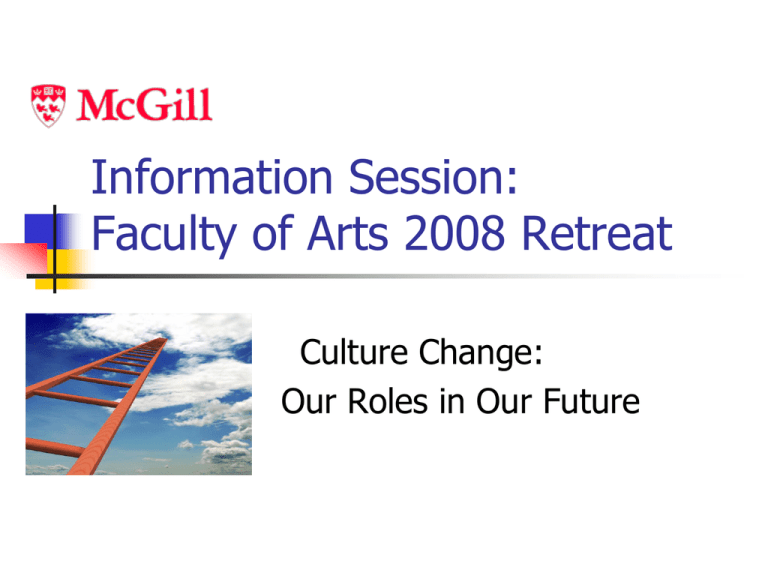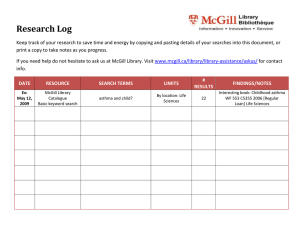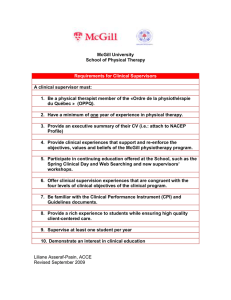Information Session: Faculty of Arts 2008 Retreat Culture Change:
advertisement

Information Session: Faculty of Arts 2008 Retreat Culture Change: Our Roles in Our Future Culture Change Our Objectives Rethink our current processes and procedures Design a better work environment for ourselves and our colleagues Communicate more effectively and develop team approaches to our shared areas of responsibility Transform our current workplace culture and meet our goals and objectives together Culture change? To boldly go where no one has gone before! Strategic Planning Process In conjunction with the Office of the Provost and the Dean: Compact: Information from Chairs, Directors, professors, staff and students The White Paper, Strengths and Aspirations Campaign Priorities: Campaign McGill and the Future of Arts Principal’s Task Force on Student Life and Learning: Education, Principal's Report on Student Life McGill Master Plan : Employs strategic plans, i.e., Guiding Principles Planning and Budgets 2008-09 Faculty of Arts: $935,000 budget reduction $468,000 to a University reallocation pool Criteria to be established by the Provost Determined by the Dean in consultation with Chairs/Directors Aligned with University/Faculty priorities Planning and Budgets 2008-09 $467,000 as a permanent cut to the Faculty 5% reduction in operating costs Reduced permanent funding for summer session courses Reduced permanent funding for supplementary teaching Administrative restructuring with the Faculty of Arts Secretariat Compact Key Areas Academic Renewal Tenure track expenditures for recruitment, salaries, start-ups and related items Form the drivers behind many resource allocations including Hiring pool model, which considers academic salary dollars and targets complement numbers simultaneously Compact Key Areas Comprehensive financial review: global resource availability Emphasis on global expense-revenue scenarios Examples include budget revenue and expense planning from units/faculty/ departments Compact Key Areas Strategic Planning, Benchmarking and Accountability Based on: The White Paper: Strengths and Aspirations The Principal’s Task Force Compact Key Areas Multi year allocations Allocations are planned on a three year time frame Examples include capital expenditures, capital equipment, sessional hiring, etc. Capital Campaign Priorities Capital Campaign Priorities Support and Nurture our Superbly Talented Students Scholarships and Bursaries Undergraduate Research Experience Campaign Priorities Graduate Students Fellowships/In-course Awards Graduate Research Experience Campaign Priorities Establish Strategic Excellence in Teaching and Research Policy Studies Health Policy (Institute for Health and Social Policy) Social Policy (School of Social Work) Public Policy (McGill Institute for the Study of Canada) Policy Analysis (Social Statistics and Public Policy) Campaign Priorities Establish Strategic Excellence in Teaching and Research Language, Literature and Culture Institute of Islamic Studies First Nations Creative Writing Campaign Priorities Establish Strategic Excellence in Teaching and Research International Development Institute for International Development Campaign Priorities Interdisciplinary Initiatives Law and Society Gender and Sexuality Campaign Priorities Support Academic Innovation Visiting Professorships Dean’s Research and Teaching Initiatives Fund Campaign Priorities Support our People and Programs with Improved Facilities Infrastructure/Physical Facilities Dean’s Priorities Capital Campaign priorities Graduate student funding Department undergraduate student advising initiatives Faculty research initiatives Financial and administrative infrastructure Faculty of Arts 2008 Retreat “McGill will offer opportunities for professional development and growth and create a work environment conducive to enhanced productivity and improved job satisfaction for all personnel – administrative, secretarial, technical and clerical.” Faculty of Arts 2008 Retreat “McGill will work in a variety of ways to improve the working conditions and professional development opportunities of the administrative and support staff whose work makes possible the achievements of our professors and the success of our students.” Faculty of Arts 2008 Retreat “McGill will support its employees to achieve new processes and outcomes in our renewed focus on service and communicate to them that their contributions are valued.” (White Paper, Section 8: Administrative and Support Staff: Inclusion and Service) Personal Objectives? Meet and Greet Session May 14, 2007 Involvement Collaboration Innovation Communication Faculty of Arts 2008 Retreat Premise To meet the objectives identified in the White Paper To ensure that all staff are aware of the goals set out in the compact and planning documents To include all staff members in the compact and planning process Our Roles? How does this affect me? More work for me? More training and courses? More responsibility? More accountability? More, more, more…. Fear Factor? What is the worst case scenario? Take courses Learn new skills Be more knowledgeable Participate in Faculty/University decisions Attend meetings Give advice, recommendations Be part of the changes, be part of the team What is the best case scenario? Take courses Learn new skills Be more knowledgeable Participate in Faculty/University decisions Attend meetings Give advice, recommendations Be part of the changes, be part of the team! Our biggest asset YOU - Our support staff who can adapt and move with the changes YOU- Are the communicators, the facilitators and the implementers of the policies and practices of the University YOU- Are a key component of why McGill is ranked 1st in Canada and 12th in the world Key Areas Electronic Procedures Manual/Timetable Group together similar job functions Involve those that perform similar areas of responsibility Rethink and redesign the process Post findings on intranet site Key Areas Electronic Procedures Manual/Timetable Components Narrative: Areas of responsibility Process Mapping Timeline Resources Key Areas Identification of the required skills/abilities for each position Language skills Technical skills Key Areas Identification of the key back up areas and security Identify back up areas for each process Ensure surrogates have appropriate training and security Schedule the work on a recurring basis Key Areas Identification of Staff Development Courses (soft skills) to complement each area Setting priorities Coping mechanisms Conflict resolution Career development All Inclusive Organize groups around the work processes Take responsibility for those areas and challenge the process Invite those involved in the process Discuss areas of mutual concern and recommend changes Retreat Location/Dates Hotel du Parc (New Residence Hall) 3625 Avenue du Parc, Montreal, QC H2X 3P8 Two Days: June 17th (Tuesday) and June 18th (Wednesday) Commitment: 1 day All support staff to attend Priority of the Dean Retreat Focus Group Team Focus Team Members: Leila Al-Bassit: leila.albassit@mcgill.ca, 398-6658 Karin Bourgeois: karin.bourgeois@mcgill.ca, 398-8567 (temporary 00783) Sharon Barqueiro: sharon.barqueiro@mcgill.ca, 398-3254 Kathleen Holden: kathleen.holden@mcgill.ca, 398-6211 Kathy Lauer: kathy.lauer@mcgill.ca, 398-4217 Kim Reany: kim.reany@mcgill.ca, 398-4400 ext. 09137 Linda Tom: linda.tom@mcgill.ca, 398-2161 (Peterson Hall -5802) Get involved! Volunteer to become team leaders and motivators Assist with set up and management of the retreat Contact any one of our Focus Group Team We need your support to ensure we all succeed! Retreat Outline 8:00 – 9:00 a.m. – Breakfast 9:00 – 9:20 a.m. – Welcome: Associate Dean 9:20 – 1:00 p.m. – Guest Speakers and Workshops 1:00 – 2:00 pm – Lunch 2:00 – 4:00 pm – Workshops 4:00 pm - Reception End of Show! (Thank goodness!) Ms. Kathy Lauer Presentation by Kathy Lauer, Area Personnel Office, Faculty of Arts Secretariat Wrap Up Comments? Questions? Please complete our questionnaire Recycle your name tag for the Retreat See you in June!

